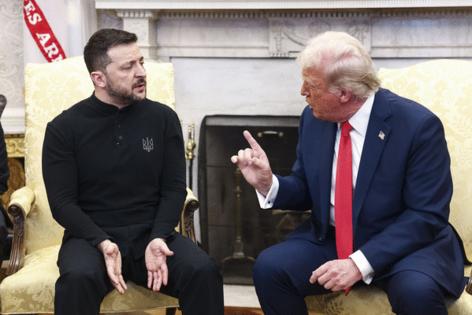Uneasy US allies set to plead with Trump to stand behind Ukraine
Published in News & Features
Ukraine President Volodymyr Zelenskyy and his European allies arrive in Washington on Monday anxious to find out what Donald Trump committed to at his summit with Vladimir Putin and apprehensive that he’ll force Kyiv into making unpalatable concessions.
Trump will host Zelenskyy and several European leaders to set out terms for a potential peace deal he discussed with Putin at last Friday’s meeting in Alaska. While the U.S. is expected to focus on territorial concessions demanded by Russia, Kyiv will seek to pin down possible security guarantees, according to a person familiar with the matter.
Unease hangs over the allies, which have few options for pushing back on demands from Trump that Ukraine may oppose, and are skeptical that Putin really wants peace. Another challenge is Trump himself: he wants a quick peace deal but has offered little clarity on how to get there.
Trump told leaders in a weekend call that he’s open to U.S. involvement in guarantees of Ukraine’s security, other people familiar with the matter said. All asked not to be identified to discuss private deliberations.
He also told allies he wanted to reach a deal quickly and would urge Ukraine to agree to one, with the goal of holding a Putin-Zelenskyy meeting within a week. That’s a timeline that many of the Europeans regard as too aggressive, given how many issues remain unresolved.
The people said Trump revealed elements of his conversations with Putin in calls with allied leaders, though without much detail. Senior European diplomats privately vented frustration at the outcome, noting Putin appeared to have gained most from the summit.
Leaders were also weighing the fact that Trump’s own team sought to tamp down expectations for a quick solution.
“We’re still a long ways off,” Secretary of State Marco Rubio, who took part in the summit, told Fox News on Sunday. “We are not at the precipice of a peace agreement. We are not at the edge of one. But I do think progress was made.”
Over the weekend, Trump golfed and steered clear of further insight on his meeting with the Russian president. In posts on Truth Social, he said the media “distorts the TRUTH when it comes to me.”
“There is NOTHING I can say or do that would lead them to write or report honestly about me,” he said. “I had a great meeting in Alaska on Biden’s stupid War, a war that should have never happened!!!”
In a series of television interviews, Rubio said Monday’s meeting would focus on security guarantees for Ukraine, including what the U.S. would contribute. He also said the US has little to lose if talks collapse — and that continuation of the war would have little impact on daily American life — suggesting that Trump might be willing to distance himself from the conflict entirely.
The stakes couldn’t be higher. Russia continues to make slow but steady advances in eastern Ukraine and Europe may struggle to fill the gap in weapons and ammunition now that Trump has scaled back U.S. support.
In his calls, Trump also said Putin wants Ukraine to cede control of its entire eastern Donbas region of the Donetsk and Luhansk provinces, renewing earlier demands, Bloomberg previously reported. That would hand Russia a victory it has been unable to achieve militarily since fighting first erupted in 2014, and in an area where Ukraine retains heavily-fortified defenses.
Russia would also halt advancing its claims over the parts of Ukraine’s Zaporizhzhia and Kherson regions that it doesn’t now control, effectively freezing the battle lines at current positions. The Kremlin could also potentially withdraw troops from areas of northeastern Ukraine near the Russian border where its forces control only small pockets of land.
That raises the prospect that the “land-swapping” Trump has teased as part of any deal will be lopsided in Putin’s favor by giving him control of areas beyond what he’s seized, offset by modest concessions of land that had been Ukraine’s anyhow.
“If we’re weak today with Russia, we’re preparing the conflicts of tomorrow, and they will affect the Ukrainians,” said French President Emmanuel Macron, who will be among the leaders joining Zelenskyy in Washington. “And let’s not fool ourselves, they also can affect us, at a time when our country continues to regularly face cyber attacks.”
Trump’s special envoy Steve Witkoff, who was also at Friday’s summit, told CNN’s State of the Union on Sunday that “We got to an agreement that the U.S. and other nations could effectively offer Article 5-like language to Ukraine.”
That’s a reference to NATO’s mutual-defense clause committing member states to respond if any one of them is attacked. Italian Prime Minister Giorgia Meloni floated a similar proposal in March, though Witkoff didn’t elaborate on what sort of security guarantee may be offered to Ukraine. The U.S. has ruled out NATO membership for Ukraine.
Something similar to Article 5 would be significant, but it would require American involvement, said John Herbst, a former U.S. ambassador to Ukraine who is now senior director of the Atlantic Council’s Eurasia Center. “European troops, at an absolute minimum, are going to need American intelligence and American logistics,” he said in an interview.
_____
(With assistance from Daryna Krasnolutska, Eric Martin and Phil Serafino.)
_____
©2025 Bloomberg L.P. Visit bloomberg.com. Distributed by Tribune Content Agency, LLC.







Comments